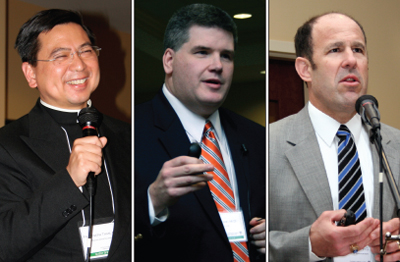
 COLUMBIA—Catholic doctors face countless challenges daily, not only in practicing medicine but in reconciling the teachings of their faith with difficult moral and ethical issues arising from today’s medical technologies.
COLUMBIA—Catholic doctors face countless challenges daily, not only in practicing medicine but in reconciling the teachings of their faith with difficult moral and ethical issues arising from today’s medical technologies.
Those concerns and how to face them were the main topic at the inaugural meeting for the Diocese of Charleston’s physicians guild, held Jan. 30 at St. Peter Church in Columbia.
About 50 doctors, members of the clergy and others in the medical field attended the event, which was organized by Bishop Robert E. Guglielmone. More than 20 who registered were unable to make it because of ice and snow that hit parts of the state that day.
Father S. Joseph Tham opened the meeting with an overview of the bioethical challenges facing Catholic medical professionals today. Father Tham was a family physician before becoming a priest with the Legionaries of Christ. He currently teaches bioethics at Regina Apostolorum Pontifical University in Rome.
Catholic physicians must deal with several levels of issues including abortion, contraception, euthanasia, current debates about stem cell research and cloning, Father Tham said.
New challenges will continue to emerge as scientists experiment with gene therapy.
Father Tham said a secular approach to bioethics has developed in recent years, although religious viewpoints were often at the foundation of bioethics when the field first started.
Secularism, he said, has taken over as society has become more accepting of contraception, abortion, same-sex unions and other things that alter human nature.
Ethical dilemmas, he added, also happen when people believe in what he calls scientific positivism.
“This idea says that science can lead to all truth, cure all diseases, that you should not try to put limits on scientific research,” he said. “In some ways, science has replaced religion for many people. In ways, they are seeking and trying to find salvation and immortality in science and medicine.”
The priest said Catholic physicians should be prepared to engage secular society and promote a culture of life.
Dr. Greg F. Burke, medical director of Geisinger HealthSouth Rehabilitation Hospital in Danville, Pa., offered a thoughtful session on “The Conscience of a Catholic Physician.”
“As Catholic Christians and as physicians, we have a unique way of looking at our profession that enriches it,” he said. “Our way of looking at things is nourished by our faith, the sacraments, and the magisterium.”
Physicians must make sure their practice incorporates a respect for human life, the promotion and protection of Christian sexual ethics, and the recognition and defense of the dignity of the human person, he said.
Burke offered a 21-question “Examination of Conscience” for the Catholic doctors that included queries on whether they treated all patients with respect, stayed current with new developments in medicine and cared more about the work itself than financial gain.
“Money should not be the primary motivation,” he said. “If I’m in medicine mainly for prestige, I need to examine my conscience.”
He urged physicians to defend their rights of conscience and share their faith by example.
“If we’re working in a secular environment, we should be asking ‘How can I enhance the culture for the better?’” he said.
Bishop Guglielmone discussed the Gospel of Luke and how the saint, who is traditionally believed to have been a physician and painter, offers a special perspective on Christ as a healer.
“This Gospel shows an empathetic image of Jesus,” he said. “Physicians see people as they are, and Luke presents Jesus as he sees him, as a strong, compassionate man. Luke saw people and loved them all, and his Gospel shows God becoming human in a very beautiful way.”
Bishop Guglielmone went over the Gospel’s many accounts of Jesus as healer, and said the stories might relate to the physicians’ own experiences.
“Jesus equates the kingdom of God with healing, and many times he does a healing despite criticism,” he said. “Perhaps there have been times you assisted in healing someone at great cost to yourself. In Luke, we see a Jesus who is so in touch with the human condition, so ready to reach out and make a difference in the lives of people.”
John F. Brehany, Ph.D., executive director and ethicist for the Catholic Medical Association, talked about the organization’s history, growth and goals for the 21st century.
He encouraged those present to form a guild and join the association, which strives to uphold Catholic principles in the medical field, help Catholic physicians network, andmake more people aware of Catholic medical ethics.
Several participants told Bishop Guglielmone they would like to continue the meetings in the future, and work with him on ways to address the ethical, moral and spiritual aspects of today’s medical issues.
“I think this meeting was a fantastic idea, and I hope we continue to meet together,” said Dr. Victoria Stoeppler, a pediatrician who attends St. Mary Help of Christians Church in Aiken. “The speakers, especially Father Tham, really showed all of us the difficult problems we’re facing as physicians today. This kind of thing is absolutely needed so we as Catholic physicians can be more proactive in educating the public about ethical issues.”
Doctors interested in joining the guild or finding out about future meetings can e-mail medicalguild@catholic-doc.org.
